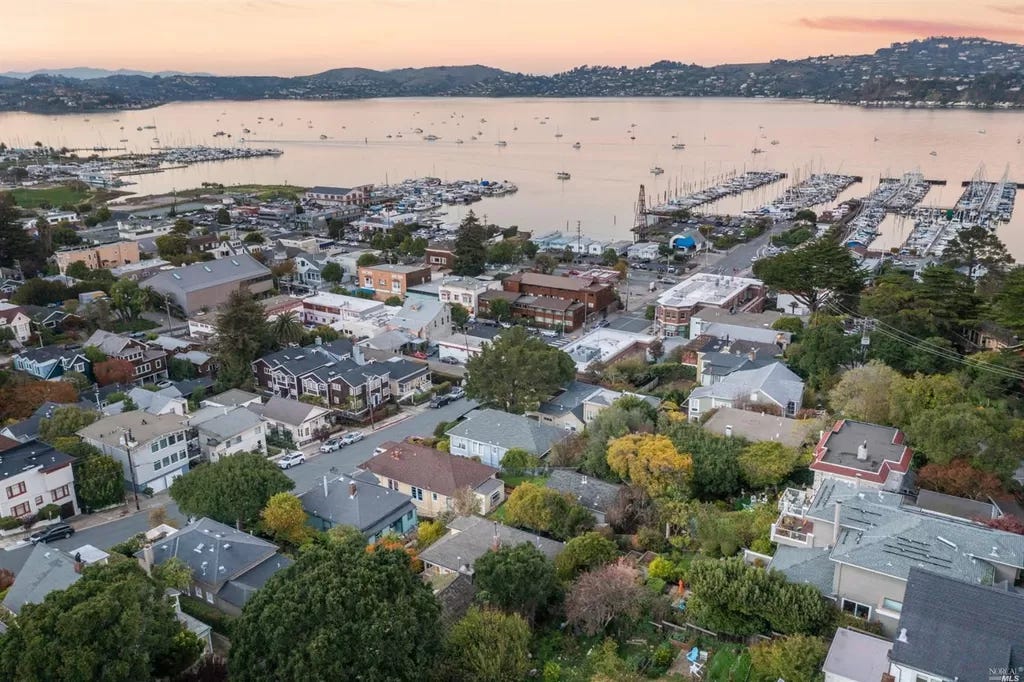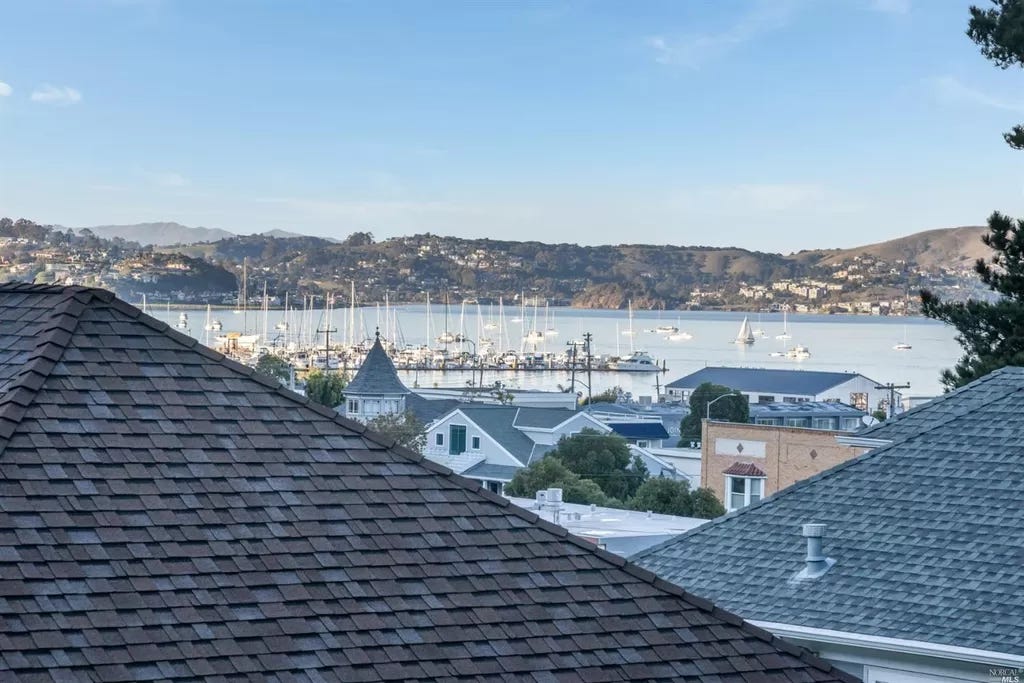This Place in Sausalito Has Much to Love at a Discount
Maybe it's because the town is haunted (or segregated) but this one has ...something that feels lost or timeless
I’ve been on a real Love Boat (or I should say The Love Boat) kick recently.
It started with an unintentional subscription to Paramount+, which happened so the seven-year-old could get ideas for his Indiana Jones Halloween costume, and now the network of castoff (or should I say ...castaway(?) ...sorry) reruns has turned into a member of the family.
I’m assuming luring people in with their day TV fever dreams is their business model btw.
Anyway, I’m on season four of the sea-faring romp (which, and I haven’t gone on a ...deep dive into any of The Love Boat message boards, but I’m assuming there’s probably a Reddit that somehow connects captain Merrill Stubing to the January 6 insurrection), is when the show really gets its (one more and I’ll stop) sea legs.
I mean, pre-Bosom Buddies Tom Hanks goes so hard as a cad/former college buddy of Gopher’s—young and handsome and playing all the way against type, that the series refuses to be ignored.
After that, there are at least two To Be Continueds (I haven’t gotten through the entire slate yet)... the second of which is a taut mystery-at-sea-style caper featuring Skip Stephenson, Connie Francis, and Jimmie Walker—try getting that band back together; there’s also a sidebar of Dick Van Patten playing a media mogul who’s trying to lure the captain away from his ship to run his conglomerate in New York City. The captain is torn because by now, he’s got full custody of daughter Vicki, and he wants what’s best for her.
It’s in this conundrum where you really see Doc played (not as much for lecherous laughs but a lived-in intimacy; as if he’s as tired of being on the show as Doc is of being on the ship) by Bernie Kopell—really throw down.
On the lido deck at night after a little soirée, it's just the captain and the ship’s medicine man. Merrill (they call one another by their first names in this season—the writers are feeling themselves) confides that he’s thinking of leaving the Princess.
There’s an exchange where the captain’s like, “it’s just a silly love cruise, how much more can I take?” and the pair exchange a look and almost break the fourth wall. Almost.
Kopell, in his part of the exchange, rhapsodizes that he “came on board” from his live-in Beverly Hills (I'm assuming that meant from his time as Siegfried in Get Smart and maybe a wink to show creator Aaron Spelling, then—and forevermore—that tony enclave’s favorite scion) to “find himself,” or “maybe figure out the person I wanted to become.”
They share a laugh after Doc waits for a beat and say in staggered unison, “We didn’t find out anything.”
Right!
I mean, I’m assuming this whole cast was making god money and for MacLeod especially whose bona fides were unparalleled; his Murray Slaughter on Mary Tyler Moore holds up today as of the best straight men in the small screen’s history; also check out his turn on McHale’s Navy alongside Ernest Borgnine if you find yourself becoming a GavHead like me. (He died this past May at the age of 90 in Palm Desert and also, consequently, married Patti Kendig twice—so he DID know a thing or two about love on land as well.)
The coup de gras guest-star-wise aired on November 22, 1980, and featured Loni Anderson, Charles Frank, Robert Stack, the Village People, and Betty Freaking White. It’s an ensemble cast with three (four? Five?) intertwined plots that come together so neatly it’d make Tarantino want to pull out his pen and start copying it right down.
From the madcap involving Gopher and Isaac buying a racehorse and spending the episode keystone cops-style trying to corral the damn equine aboard the ship—to the sublime, a horny and eager Betty White spurned by her lover in favor for his horse seeks revenge in the arms of another.
Good times.
The Village People are there to promote their 1980 flame-out vehicle Can’t Stop the Music and perform, complete with balloon drop, the first single from that giant goopy mess, “Magic Night,” complete with cutaways to the cast members and guests.
Loni, in her mother-loving prime, plays an actress bedeviled with too much media attention. In very-true-to-life-form she’s just looking to chill in her cabin, though she does venture into the Pirates' Cove “disguised” as her assistant and then promptly falls in love with a reply guy (on the ship to meet the “real” her.) Notting Hill-style he quickly eschews his devotion for the actress her and demands to see his real dream girl (in a brunette wig again.
It is a wild romp, one that forty-eight minutes could barely contain—and I haven’t even touched the plotline of cruise director Julie (Lauren Tewes) and her affair with “the world’s most eligible bachelor” (Stack) all in an episode aptly named “The Horse Lover/Secretary to the Stars/Julie’s Decision/Gopher and Isaac Buy a Horse/Village People Ride Again” but believe me, it’s a doozy. And a showcase of the best of who we were.
429 Johnson St Sausalito, CA 94965
I guess I’m pretty basic in that if you asked me what to watch, I’d say Succession or The Sopranos, two shows I’ve either binged or watched back with care over the course of the pandemic.
To me, both represent the run-up to and the full-fledged version of America in ruin as we’ve gone from broken-down but still-functioning democracy clearly in need of an overhaul yet still putting down the highway—to a full-fledged member of the backsliding democracies list ...all within two-decades time.
The Sopranos did the best job of chronicling our efforts to debase and, in the end, tear apart the fabric of a nation using shenanigans, an ever-moving target of what’s right and decent, and leveraging racism into victimhood, along with the traditional grift of crime and law enforcement to bring everything to tattered streets and dirty storefront end. Succession just focuses on the lives of vampires, backbiting and infighting, while they live off interest and profit off anger.
In either case, it’s a ...bleak reflection of who we are. I don’t want to say too much about what TV is and what’s in us—because it’s all fantasy. These are writers and actors, after all, all of whom breathe (at least for moments at a time) some pretty rare is.
But also, The Love Boat, when examined closely, shows us that possibility, that dressing up, that acting goofy and light and spreading it all around with such gauzy innuendo that you couldn’t help but laugh with that and at them.
…And that was (is?) the point.
It’s not a nostalgia thing to me, the fact that you could say and do certain things that you “can’t do” now. That’s just not true.
You can say and do anything, but if it’s scornful, hurtful, punching down, or not funny—the act grows old. That’s not cancel culture; that’s just someone (usually with a big megaphone) getting called out for not doing their best, or in some cases, being the absolute worst—or in all cases, feeling their relevance slip away.
We could have our Love Boats again. We could have anything. We’re the richest country in the world; we’re just taking care of the wrong people, that’s all. I would love a screwball romp aboard a ship. I would love romance and heartbreak on the high seas. Love it, I tell you. But we can’t have that because a bunch of divorced guys want to go to space and the system only works for teenage murders carrying automatic weapons and Christo-fascists spreading misinformation and controlling women’s bodies—that’s not the majority but while the rest of us are on average $80k in debt and sinking, there’s not a whole lot we can do about it.
…And that’s why maybe the only reason why it’s nice to see a show about people at sea who aren’t scrambling for the last lifeboat while everyone else drowns.
I guess I’m showing my nautically themed soft targets this week because I’ve been perusing Sausalito lately as well.
Something about that town—where I lived for a couple of years while commuting back and forth to Point Reyes for a newspaper gig—sticks with me. It’s a place whose current incarnation is built on a bedrock of racism and segregation. It’s launched a literal thousand ships, plus 999 pottery and seagrass shops. But it’s also where Otis Redding sat as a (Sittin’ On) the Dock of the Bay as a twenty-six-year-old and my oh my isn’t that just the reason for it to continue to exist.
There’s still Smitty’s Bar; the old dock workers haunt on Caledonia, and the Lighthouse Cafe on Bridgeway. There’s Scoma’s all lit up pretty at night jutting right out on the water and a handful of sea lions barking at the big mystery land of San Francisco, which so quietly scores the backdrop.
Maybe it’s a little bit of weird harbor front black magic that scares would-be permanent residents from the Streets of Sausalito. The town feels haunted with the souls of troubled fishermen, troubled dock worker diaspora, and sirens and sea witches who only stop by for a drink or two at the No Name before diving right back.
But you can still get a lot for right around the current Bay Area median home prince ($1.3 million.) Which, if you think about it, includes all the stucco row strip mall and constant congestion hell in Dublin, Pleasanton, Livermore, San Mateo, and San Jose.
In other words, you could do a lot worse than this 1914 Victorian and its secret garden.
The tiny 3/2 has been redone a little too on the nose. The kitchen is more bland than grand, and the beams have been whitewashed to oblivion. The historic hearth remains, but the built-ins are distinctly missing. IN this tased version, the Wayfair decor seems hastily assembled and cheap, and out of place.
This is a space for trinkets and antiques, maybe an oil painting or two of rough waters ahead. The floors were re-finished well, and the garden patio pairs nicely with the views of the sleepy harbor, reflecting on what was or waiting for what’s next.
Sausalito has never been a hot market, and there’s plenty about the town to hate. But this place is a rare little postage stamp. It’s cheaper than being stuck in traffic and plugging into your three-car garage set to do it all over again. A marker in time, a vestigial dreamscape of things that have already come and gone, or maybe something that aspires to a little better in the not-too-distant future.






















